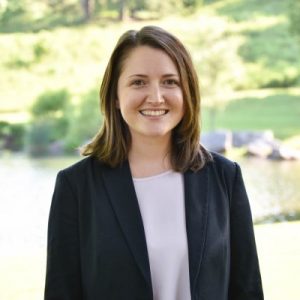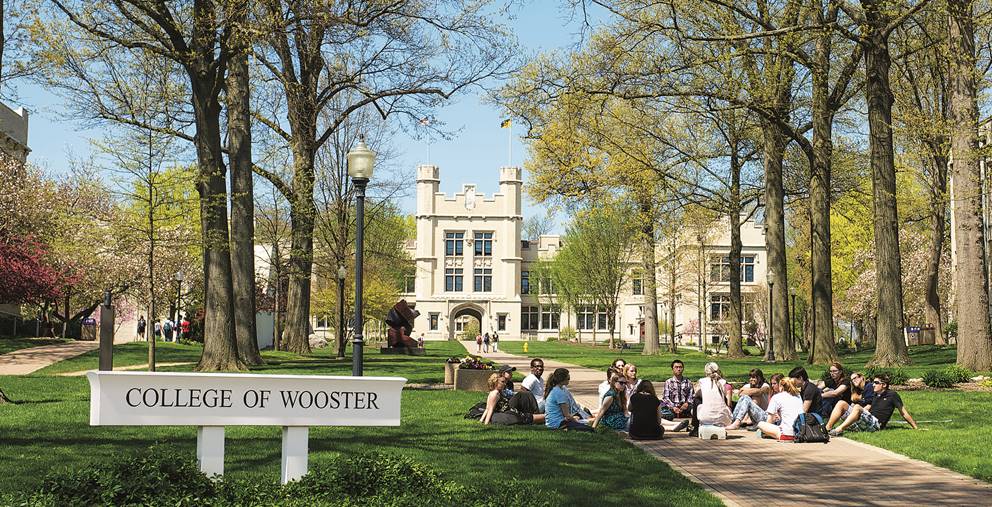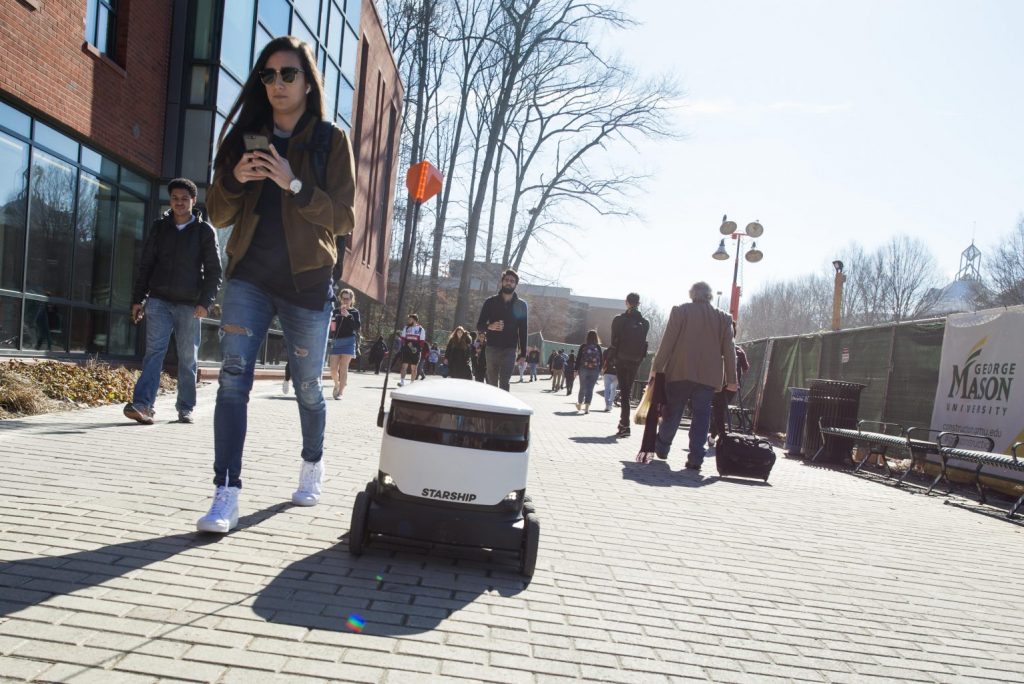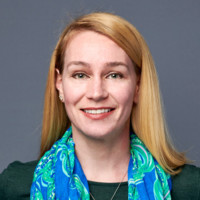Trusting in What’s New to Arrive at What’s Next: Lillian Stott, NACAS

“Trust between you and your team reassures you that things will be okay. It tells you that your team has got it, and the program or initiative is going to be fine because the person overseeing it is going to rock it out. I can’t solve it all, and that’s okay,” says Lillian Stott, interim CEO of the National Association of College Auxiliary Services (NACAS).
So far, Lillian has spent her entire career with NACAS. She started as an intern while finishing her degree at the University of Virginia and has worked her way up to chief operating officer. Like many, Lillian didn’t plan on working for an association but has stayed in the community because each season brings new and exciting challenges, and because the quality people she has met in NACAS’s orbit make her job meaningful.
We talked with Lillian about the work NACAS is doing to help colleges and their suppliers maintain their ability to build strong, lasting communities even while down a couple of positions. We also spoke about her “caretaker” role as interim CEO for NACAS, which she stepped into in March 2021. She explains how trust in her staff to support each other combined with a renewed energy to take care of the NACAS community is helping her team get things done.
Association Adviser: Tell us about your educational background and how you made your way into working with associations.
Lillian Stott: I made my way into association work because of a combination of my interests in nonprofit work and a serendipitous internship assignment. At the University of Virginia, I earned a degree in Classics because I enjoyed learning Latin and the engaging, discussion-focused classes that department offered. UVA’s Classics department is great, and I studied the material from a place of interest and joy rather than as preparation for a defined career path.
But as graduation approached, I became a little worried about what exactly I would do post-college. Luckily, UVA has an internship program that pairs students with local businesses. You take an organizational development class alongside an internship so you can earn academic credit while experiencing a real work environment. I matched with Community College Business Officers (CCBO) because I had listed nonprofit work and education as my career interests. At the time, NACAS served as CCBO’s association management company.
Before my internship, I didn’t know much about associations or really understand their work, but as I got a behind-the-scenes look through my internship, I became really invested in NACAS. It was strange and interesting to learn about all the business and auxiliary services that go into college life today, especially as I was simultaneously taking advantage of them!
AA: You’ve spent your entire career so far with NACAS! What has motivated you to stay and grow with this association?
LS: Working at NACAS has meant a lot of opportunity and never a dull moment. It’s a small team, so you are exposed to a lot of processes and projects. You learn a lot in any NACAS role. I never feel like I’m doing the same thing every day or every year, and when I look back at the titles and roles I’ve had, I realize how much my work and NACAS’s larger projects are always evolving. It also helps that NACAS is so engaged with fun and interesting people around the country. I have so much gratitude for our team, our volunteers and our campus contacts whom I’ve gotten to know and learn from.
AA: What leadership lessons have you learned from your predecessors?
LS: Trust is essential to everything. I’m so thankful for learning from previous leaders and for developing trust-filled working relationships with previous bosses. They taught me what it takes to build confidence through honest conversations. To know that it’s okay to let go of every action and decision because one person can’t solve it all. Trust in your team tells you that your team has got it, and the program or initiative is going to be successful because the person overseeing it is going to rock it out. Equally important is knowing how trust can be so easily broken as well as what warning signs to look for and how to communicate with others to acknowledge and recover from even a small breach in trust.

Another important lesson is to meet people where they are. Understand where the other person is coming from so you can work together effectively. There have been times when I made assumptions about someone and their motives and became frustrated before having a ‘lightbulb moment’ about where they were actually coming from and the motivation behind their approach or decision. When that happens ̶ and when you show empathy through that lightbulb moment ̶ everything gets better, and we’re all able to move to a better spot.
AA: Some younger association professionals might not know what it means to be an interim CEO, and why you’re “interim” and not permanent CEO (at least, not yet). There are no silly questions in the Corner Office, so would you explain what it means to be an interim CEO?
LS: The interim role comes up when a CEO leaves unexpectedly. Most associations have succession plans for when their top leadership retires or otherwise wants to transition out of the role and offers advance notice. But when CEOs leave quickly because of another career opportunity, the association needs someone with institutional knowledge who can take care of the organization and prepare it for the next CEO. That’s really what an interim CEO is: a caretaker. They ensure current projects continue, that the board and staff have what they need to move forward, and that the association continues to grow.
For NACAS, we’re moving forward with a CEO search which I wholeheartedly support. We’ve faced so much and we’ve grown so much as an association over the last five years. We’re looking for someone who will help continue that growth and anticipate how NACAS can help higher ed with its future challenges. Sometimes the interim CEO moves into the permanent role; sometimes not. But the goal is to find a long-term CEO who can guide the associations and its industry through challenges and successes.
AA: How’s the interim job going?
LS: It’s going well! I’ve been interim CEO since March 20. It has taken a lot more work than my previous role [chief operating officer], in part because I’m still managing those responsibilities. Plus, we had a reduction in force in December 2020 and had some other recent turnover in positions that have kept all of us working really hard to fill gaps. Being down two full-time staff members is hard, but we’ve filled one of those roles and are planning to hire some temporary help to backfill some administrative work until the new CEO is hired. We’re a small but mighty team!
An unexpected challenge and the hardest part of my job is getting used to self-validation. When you’re the CEO, there’s no one above you on the org chart to offer reassurance on an idea or path forward. Of course NACAS has a collaborative and appreciative culture among volunteers and staff alike, so there is certainly validation through that, but in the CEO role you have to maintain confidence in your work at a different level than I’ve had to before.

AA: What major goals do you want to achieve for NACAS this year?
LS: More than ever, we’re aiming for business continuity. That’s not glamorous, but it’s necessary! All of the things we’ve been doing for years are built around the capabilities of a 15-person team. Now we have just 11 people (once we’re back to being fully staffed), but we need to keep offering essential programs to members. The question becomes, how do we do it more efficiently? How do we act more nimbly to be able to make changes along the way?
One answer is that we’re building enough redundancies into our staff’s responsibilities that if someone else leaves, we don’t lose more institutional knowledge. At the same time, we are trying to remain efficient in spite of our staffing challenges. It’s a fine line to walk.
Another goal is to pull off an amazing C3X, NACAS’s annual conference and expo. It will likely be a hybrid event this year. We’ve never done one before, but last year we had never done a virtual event, and last year’s virtual C3X was awesome! In addition, we typically have four separate regional conferences. But this year, we’re having one joint virtual conference with several of our regions, and it’s a really cool balance of doing things differently and collaborating while keeping regional identities. It’s cool to see everything come together for members and business partners for those events.
Finally, we want to help colleges and universities figure out what campus life looks like post-COVID. Everyone in the world has realized how much community really matters after last year’s upheaval. Human connection and belonging matter so much, and college campuses are strong community centers. How do we leverage that and see that sense of community into the future while ensuring infrastructure and staff remain nimble for whatever comes their way?
AA: In terms of your job, what keeps you up at night?
LS: I worry the most about the well-being of our team. 2020 threw a lot at us: the constant unknown and anxiety of the pandemic, the reduction in force, the sudden departure of some key staff leaders. Our former CEO brought so much culture and energy to the table. Just being down some staff members and having to pick up the slack is more work that weighs on everyone, of course. Last year I worried about money. Now, while I’m cognizant of our financial position and monitoring it closely, it’s not what keeps me up at night. We all care for one another so much and I am just deeply grateful for the culture and community we have built, and I don’t want to lose that.
AA: What is a recent accomplishment you’re really proud of?
LS: First, I’m really proud of the spring expo we’re putting on this week. It’s a virtual expo for all of NACAS’s business partners to showcase their products and services and to educate our members. This is a difficult event to successfully pull off because virtual exhibiting is just not the same as in-person. But we wanted to provide an opportunity for our members and business partners to remain connected, continue to do business together, and learn from one another. We really began envisioning the details of the event about six-weeks ago. We’ve coordinated a lot in that time while down two full staff members. It has been a ton of work and I’m proud of our team pulling together to make it happen. So far, our business partners seem excited to be there.
Personally, I’m proud of getting through our annual organizational audit! There has been so much change including new executive management, financial management, and a new board treasurer. I’m proud of myself and our accounting manager for making it through the audit season. Audits aren’t generally hard, but a lot of institutional knowledge was gone this year with all our recent staff departures.

AA: What advice would you offer to a young association professional wanting to advance their career?
LS: Being authentic is really important. So is knowing when to ask for help. It’s okay to ask for help. Going back to my belief in the importance of trust, being honest about needing help builds that trust needed to make leadership work. Thankfully, I’ve had some great supervisors who have always been open to me asking for help.
Have courage, and don’t be afraid to try something new. There have been a lot of times where I’ve thought, I’m not sure I can do that! Learn to be okay with trying and taking on a new role. Don’t be so afraid of failing at it or of not knowing every detail of the role. Don’t let that hold you back.
Finally, especially for younger female professionals, self-talk can be very real. “Am I doing a good job? Am I meeting expectations?” you might ask yourself internally over and over. Learn to manage your self-talk. Mentors can help you improve your self-talk habits and point out ways to boost your confidence. I’ve had some great professional mentors who were incredibly helpful in seeing me through impostor syndrome. Simple things like going for walks to clear your head can help as well.


